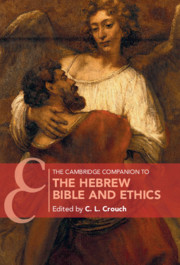Book contents
- The Cambridge Companion to the Hebrew Bible and Ethics
- Cambridge Companions to Religion
- The Cambridge Companion to the Hebrew Bible and Ethics
- Copyright page
- Dedication
- Contents
- Notes on Contributors
- Introduction
- Part I Legal Ethics
- Part II Narrative Ethics
- 6 Creation Ethics in Genesis
- 7 Migrant Ethics in the Jacob Narratives
- 8 Settler Mandates and the Book of Joshua
- 9 David’s Ethic of Togetherness and Its Victims
- 10 Ethics and Ethnicity in the Deuteronomistic History
- Part III Prophetic Ethics
- Part IV Wisdom/Poetic Ethics
- Part V Faithful Ethics
- Index
- Cambridge Companions to Religion (continued from page iii)
- References
10 - Ethics and Ethnicity in the Deuteronomistic History
from Part II - Narrative Ethics
Published online by Cambridge University Press: 05 February 2021
- The Cambridge Companion to the Hebrew Bible and Ethics
- Cambridge Companions to Religion
- The Cambridge Companion to the Hebrew Bible and Ethics
- Copyright page
- Dedication
- Contents
- Notes on Contributors
- Introduction
- Part I Legal Ethics
- Part II Narrative Ethics
- 6 Creation Ethics in Genesis
- 7 Migrant Ethics in the Jacob Narratives
- 8 Settler Mandates and the Book of Joshua
- 9 David’s Ethic of Togetherness and Its Victims
- 10 Ethics and Ethnicity in the Deuteronomistic History
- Part III Prophetic Ethics
- Part IV Wisdom/Poetic Ethics
- Part V Faithful Ethics
- Index
- Cambridge Companions to Religion (continued from page iii)
- References
Summary
Debates about immigration, national identity, and the inclusion of ethnic minorities have been a prominent part of the twenty-first century thus far. Yet, ethical questions such as how to define one’s community and whether and to what extent to include those deemed foreign are ancient. The Hebrew Bible offers a variety of viewpoints – many of them conflicting – on how to define “Israelite” and non-Israelite, native and foreign, insider and outsider. Among these is the perspective of the Deuteronomistic History (Joshua to 2 Kings), a group of texts united by a somewhat coherent ideological perspective and the focus of this essay. Even within this collection, however, are expressed a variety of positions on the treatment of different peoples in the world of ancient Israel.
- Type
- Chapter
- Information
- The Cambridge Companion to the Hebrew Bible and Ethics , pp. 147 - 160Publisher: Cambridge University PressPrint publication year: 2021
References
Further Reading
- 2
- Cited by



